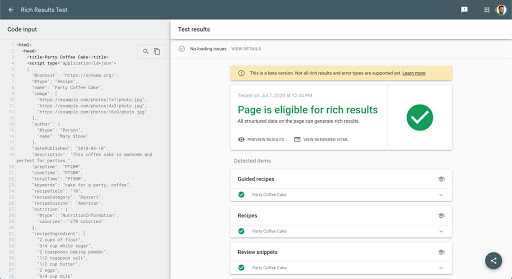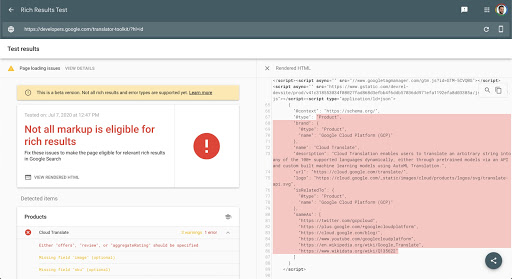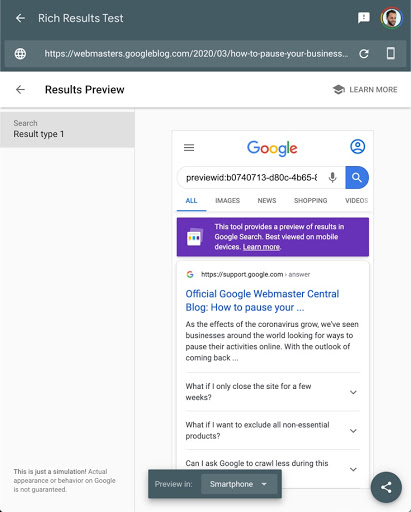Wtorek, 7 lipca 2020 r.
Dzisiaj ogłaszamy, że test wyników z elementami rozszerzonymi w pełni obsługuje wszystkie funkcje wyników z elementami rozszerzonymi w wyszukiwarce Google – nie jest już w wersji beta. Oprócz tego przygotowujemy się do wycofania Narzędzia do testowania uporządkowanych danych. Na razie będzie ono dostępne, zalecamy jednak, aby uporządkowane dane testować i weryfikować za pomocą testu wyników z elementami rozszerzonymi.
Wyniki z elementami rozszerzonymi to funkcja wyszukiwarki Google pokazująca więcej informacji niż tylko standardowy niebieski link. Funkcja wykorzystuje uporządkowane dane i może wyświetlać karuzele, obrazy oraz inne elementy nietekstowe. W ciągu ostatnich kilku lat opracowaliśmy test wyników z elementami rozszerzonymi, który ułatwia testowanie uporządkowanych danych i wyświetlanie podglądu wyników z elementami rozszerzonymi.
Nowe narzędzie jest lepsze z kilku powodów:
- Pokazuje, które ulepszenia funkcji wyszukiwarki są odpowiednie dla dostarczonych przez Ciebie znaczników.
- Efektywniej obsługuje ładowane dynamicznie znaczniki uporządkowanych danych.
- Generuje wynik w wersjach komputerowej i mobilnej.
- Jest w pełni zgodne z raportami Search Console.
Za pomocą testu wyników z elementami rozszerzonymi możesz przetestować fragment kodu lub adres URL strony. Test zwraca błędy i ostrzeżenia dotyczące strony. Uwaga: błędy powodują, że strona nie pojawia się jako wynik z elementami rozszerzonymi. Ostrzeżenia mogą ograniczyć wyświetlanie niektórych treści, ale strona nadal może pojawiać się w wynikach z elementami rozszerzonymi. Jeśli na przykład ostrzeżenie dotyczy braku właściwości obrazu, strona może być wyświetlana jako wynik z elementami rozszerzonymi, jednak bez obrazu.
Oto kilka przykładów tego, co zobaczysz, korzystając z tego narzędzia.



Dowiedz się więcej o teście wyników z elementami rozszerzonymi. Jeśli chcesz przesłać opinię, skontaktuj się z nami na forum pomocy lub na Twitterze.
Autor: Moshe Samet, Search Console Product Manager
